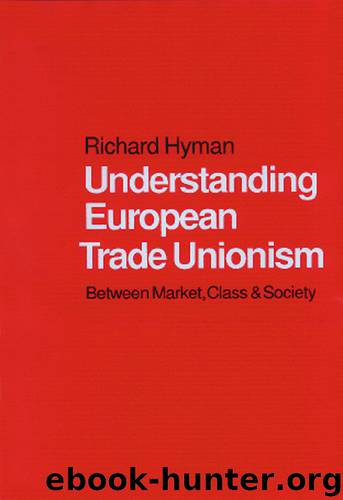Understanding European Trade Unionism by Hyman Richard;

Author:Hyman, Richard;
Language: eng
Format: epub
ISBN: 254654
Publisher: SAGE Publications
Published: 2001-05-17T16:00:00+00:00
A Transformation of British Trade Unionism?
The opportunity, if such there was, passed rapidly; the 1979 election was to bring the climax of a ‘Copernican revolution’ (Fox, 1985: 373). The Conservative Party under Thatcher embraced the philosophy of the newly ascendant economic right and sought a break with the consensual bias of all post-war governments in order to instal a regime of economic liberalism. This required the imposition of strict monetary disciplines, the end of direct state intervention in the functioning of markets and the removal of institutional constraints on their ‘free’ operation. Among these, trade unions were the most important. ‘Solving the union problem is the key to Britain’s recovery’ was the title of a pamphlet published by Keith Joseph, one of Thatcher’s most senior colleagues, immediately before the election.
Few believed at the time that the Conservatives, once in office, would pursue such a project; or, if they were to start on the projected course, that they would persist. Heath’s failure was an object lesson. Clegg (1979: 378), writing shortly before the election, took it for granted that a Thatcher government, like Heath’s, would be forced to turn from market liberalism to an incomes policy: ‘the relevant question therefore is not whether Britain will soon see the last of incomes policy, but whether the future will bring another series of short-lived policies or one lasting one.’ Even ‘a social contract between the unions and a Conservative government’ could not be excluded (1979: 381–2). Another academic observer, writing immediately after the election, argued that previous decades had seen a growing development of corporatism in Britain which was unlikely to be reversed. ‘The Tories . . . cannot afford to be seen as anti-union. . . . It would be surprising indeed if the Thatcher government does not attempt at some point to forge a policy consensus among the major interest groups; if it does, and especially if it attempts to negotiate an incomes policy, the price will be the sort of incorporation of the union movement here described. The tide of union influence may ebb and flow, but . . . will not easily be eroded’ (Thomson, 1979: 48, 54). If the dominant mood within the unions was that they could stand up to Thatcher as they had to Heath, trade unionists were in good company. But the assumptions were wrong: the tradition of militant economism, the distinctive British synthesis of class and market, was to be tested to destruction.
First, the legal framework was altered dramatically; but not, as in 1971, through a single Act which could provide a concentrated focus for resistance. From 1980 there were eight major acts of parliament as well as other lesser pieces of industrial relations legislation. The main effect was to weaken still further the limited legal protections available to individual workers, while overturning the tradition of trade union ‘immunities’. The scope for legal strike action was drastically narrowed, while the internal procedures of trade unions were subjected to detailed and onerous regulation. From one
Download
This site does not store any files on its server. We only index and link to content provided by other sites. Please contact the content providers to delete copyright contents if any and email us, we'll remove relevant links or contents immediately.
Cecilia; Or, Memoirs of an Heiress — Volume 1 by Fanny Burney(31332)
Cecilia; Or, Memoirs of an Heiress — Volume 3 by Fanny Burney(30934)
Cecilia; Or, Memoirs of an Heiress — Volume 2 by Fanny Burney(30889)
The Great Music City by Andrea Baker(21283)
We're Going to Need More Wine by Gabrielle Union(18072)
Bombshells: Glamour Girls of a Lifetime by Sullivan Steve(13108)
Pimp by Iceberg Slim(12931)
All the Missing Girls by Megan Miranda(12747)
Fifty Shades Freed by E L James(12451)
Norse Mythology by Gaiman Neil(11883)
Talking to Strangers by Malcolm Gladwell(11876)
Crazy Rich Asians by Kevin Kwan(8349)
Mindhunter: Inside the FBI's Elite Serial Crime Unit by John E. Douglas & Mark Olshaker(7833)
The Lost Art of Listening by Michael P. Nichols(6472)
Enlightenment Now: The Case for Reason, Science, Humanism, and Progress by Steven Pinker(6405)
Bad Blood by John Carreyrou(5768)
The Four Agreements by Don Miguel Ruiz(5510)
Weapons of Math Destruction by Cathy O'Neil(5036)
We Need to Talk by Celeste Headlee(4868)
